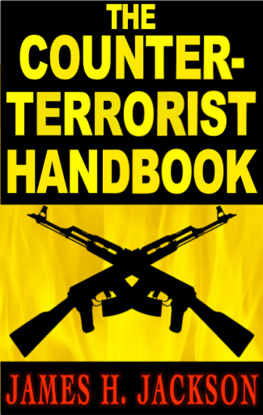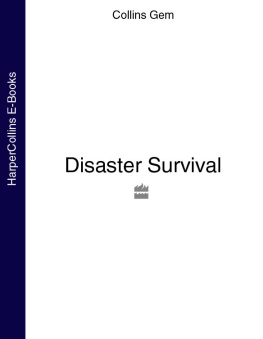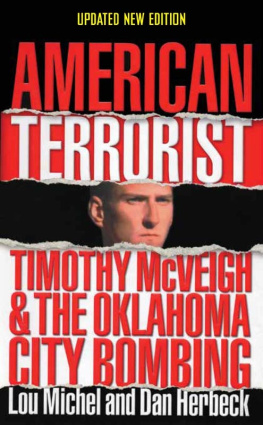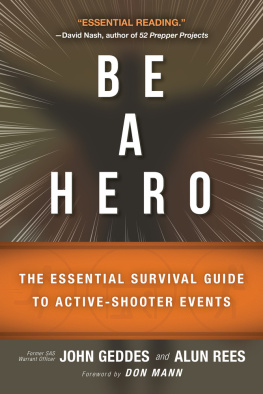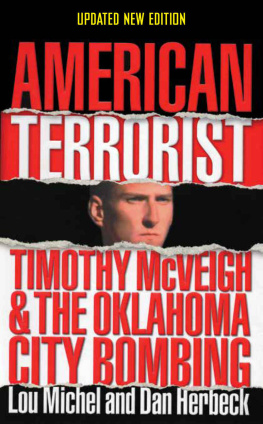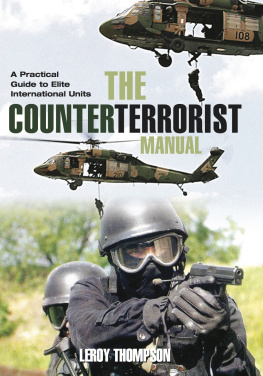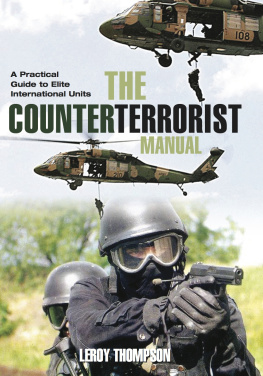The Counter-Terrorist Handbook
THE AUTHORS
James H. Jackson is a thriller-writer and former defence and political-risk consultant who has written, lectured and broadcast on terrorism and security-related issues for many years. He is a postgraduate in Defence Studies and a qualified barrister, and brings to his areas of expertise a reputation for troubleshooting and tough talking. Clients have included foreign government departments and international companies. His reputation for prescience and accuracy has been born out in articles and books, including his acclaimed 1997 thriller Dead Headers, in which he warned of government inertia, flawed security, and the likely onset of mass terrorism. He argued forcefully the need for a policy shift towards aggressive pre-emption and comprehensive prevention. Today, more people are listening.
www.jamesjacksonbooks.com
Robert Mountcastle* is a decorated former commander of British Special Forces who has organized and trained anti-terrorist units, hostage-rescue teams and foreign Special Forces throughout the world for thirty years. As a highly regarded international consultant he has been involved in a wide range of paramilitary security tasks, including corporate and executive self-protection, surveillance, maritime security, and kidnap and ransom negotiation. He is a holder of the Military Cross awarded for his actions during counter-insurgency operations overseas.
Edward Charles* is a former British Intelligence officer who has specialized for many years in counter-terrorism, counter-subversion and counter-espionage. He has worked closely with allied intelligence organizations and is fluent in a number of languages. Since leaving government service he has become one of the worlds leading crisis-management consultants and continues to advise companies and individuals on risk prevention, reduction and response.
* Note: In order to protect the identities and operational integrity of the contributors, the names Robert Mountcastle and Edward Charles are pseudonyms.
NOTE TO READERS
The publisher and authors disclaim any liability for accidents or injuries that may occur as a result of information given in this book, which is intended as a work of advice.
Every effort has been made to ensure that the information in this book is correct at the time of going to press. Nevertheless, some of the information is, by its very nature, anecdotal, changeable or disputable, and cannot therefore be assumed to be authoritative or exhaustive.
2013 James H. Jackson
James H. Jackson has asserted his rights in accordance with the Copyright, Designs and Patents Act 1988 to be identified as the author of this work.
www.jamesjacksonbooks.com
Published by James Jackson
First published and printed in 2005 by Michael OMara Books
First published in eBook format in 2013
eISBN: 978-1-78301-093-6
(Printed edition: 1-84317-140-6)
All rights reserved under International and Pan-American Copyright Conventions. By payment of the required fees, you have been granted the non-exclusive, non-transferable right to access and read the text of this e-book on-screen. No part of this text may be reproduced, transmitted, downloaded, decompiled, reverse-engineered, or stored in or introduced into any information storage and retrieval system, in any form or by any means, whether electronic or mechanical, now known or hereinafter invented, without the express written permission of the Publisher.
All names, characters, places, organisations, businesses and events are either the product of the author's imagination or are used fictitiously. Any resemblance to actual persons, living or dead, is purely coincidental.
eBook Conversion by www.ebookpartnership.com
Contents
APPENDIXES
Introduction
There is no such thing as a risk-free world. There will probably never be such a thing as a world free of terrorism. What you can do is manage that risk and reduce the chances of being caught up or caught out in a violent terror incident. Of course, luck can play its part and affect the outcome; quick wits may get you through a situation for which you have not planned. But to rely on these alone is foolhardy. There is no adequate substitute for preparedness and a pre-considered response. The most certain way of dealing with a threat, of reacting effectively, is through planning and preparation. This handbook is written precisely for that purpose. Rather than laying down rigid codes, it exists to show best practice based on many years experience. Forget showmanship, gadgetry and flashy techniques. Your safety and security, and that of your family and work colleagues, will depend to a far greater extent on commonsense procedures, a security mind-set, and rehearsal. If you absorb the advice and practise it youre ready.
Remember, we live in a target-rich environment, a world in which travel is easy, borders are porous, and where people bearing grudges or fired by some obscure fanaticism seek to exact a terrible revenge upon the world. Terrorists can hijack an aircraft or fly a business jet into an airliner. They can drive a car into a chemical tanker, sabotage an oil refinery or blow up a railway track. Its a simple fact of life. Unfortunately, they have become more daring, more brazen, more lethal, savvier and considerably more inclined to unleash mass destruction on us all. There are out there among the more extreme religious fundamentalists or animal liberationists, and others, those who want nothing more than to wreak chaos. There is even a fair percentage of sad loners and disturbed sociopaths who inexplicably feel and satisfy the urge to snipe at complete strangers from a car, to shoot up a high-school, or to gun down anyone from a shopper to a celebrity. With all the grim news reports, it must sometimes seem as though there is a bullet or anthrax spore out there with your name on it.
But relax there isnt. Our suggestion is to take a deep breath and put the problem in perspective. Terrorists are not super-villains worthy of mythical status. They may be committed, but they are still fundamentally flawed, profoundly wrong, and pathologically criminal. In the 1970s and 1980s, there were terror training camps throughout the Middle East and North Africa. Thousands were inducted through these establishments, though mercifully few appear to have gone on to practise their newly learnt craft. Theres the rub: for all the scare stories, terrorism remains essentially a minority pursuit. So far, the number of people killed through terrorist action is comparatively small. Considerably more die each year in traffic accidents, from falling down stairs or simply by becoming victims of gun-related homicide in an average US city. In spite of the phenomenon of the al-Qaeda franchise operation, there is no evidence of an exponential rise in the number of terrorist incidents across the globe. And, finally, governments and their intelligence agencies are beginning to find the meaning of competence, are proactively hunting terror groups, and are thinking laterally and planning ahead. If they can do it, so can you.
This Handbook should be a key component of your strategy. By informing you of potential terrorist threat, indicating how to reduce your likely exposure to it, and demonstrating methods of survival during terror incidents, the following pages could dramatically improve your chances of survival.
We are all vulnerable. You do not have to be a banker or businessman to be a potential target. It could happen in your home town. It could happen to you.

